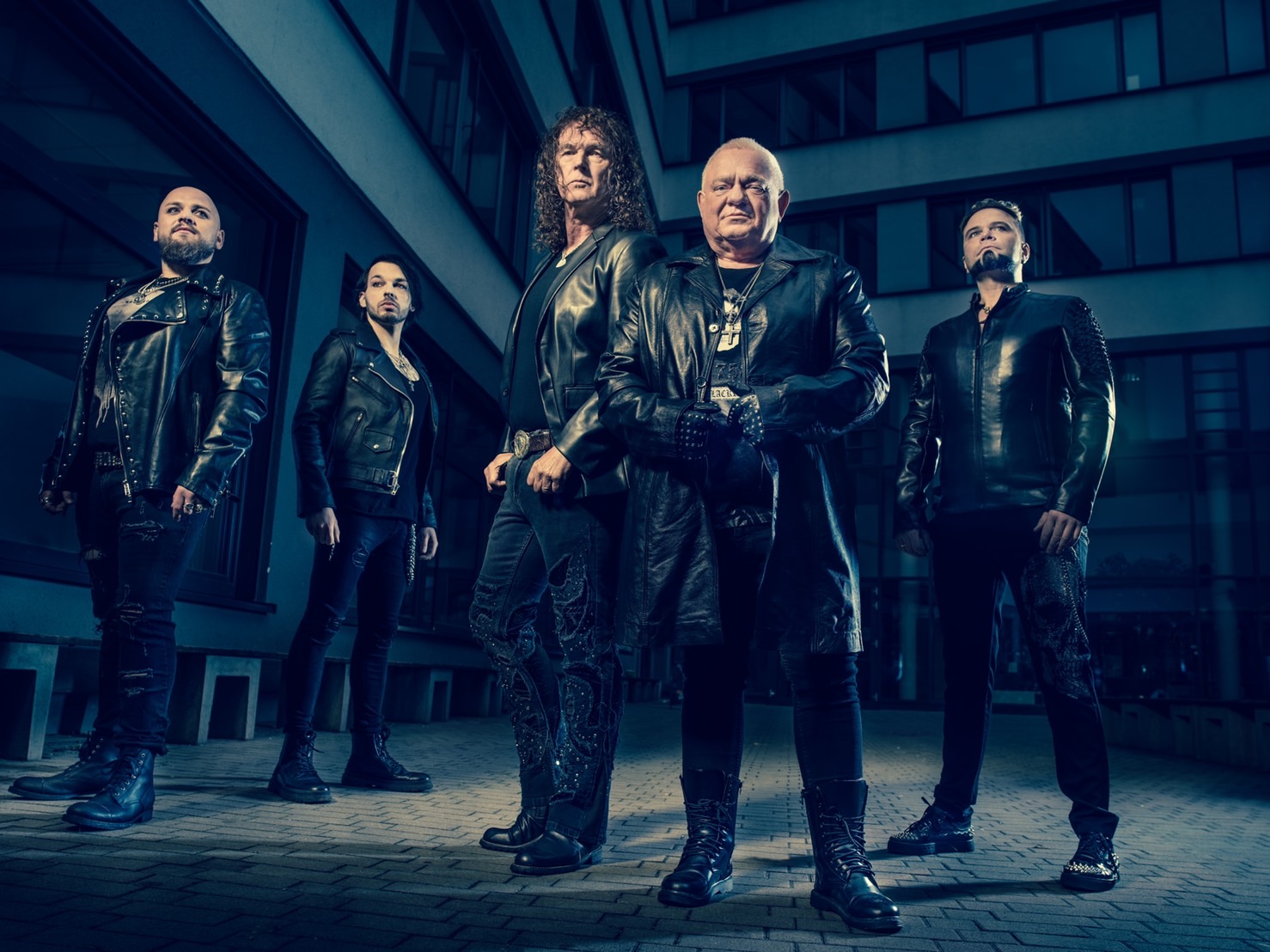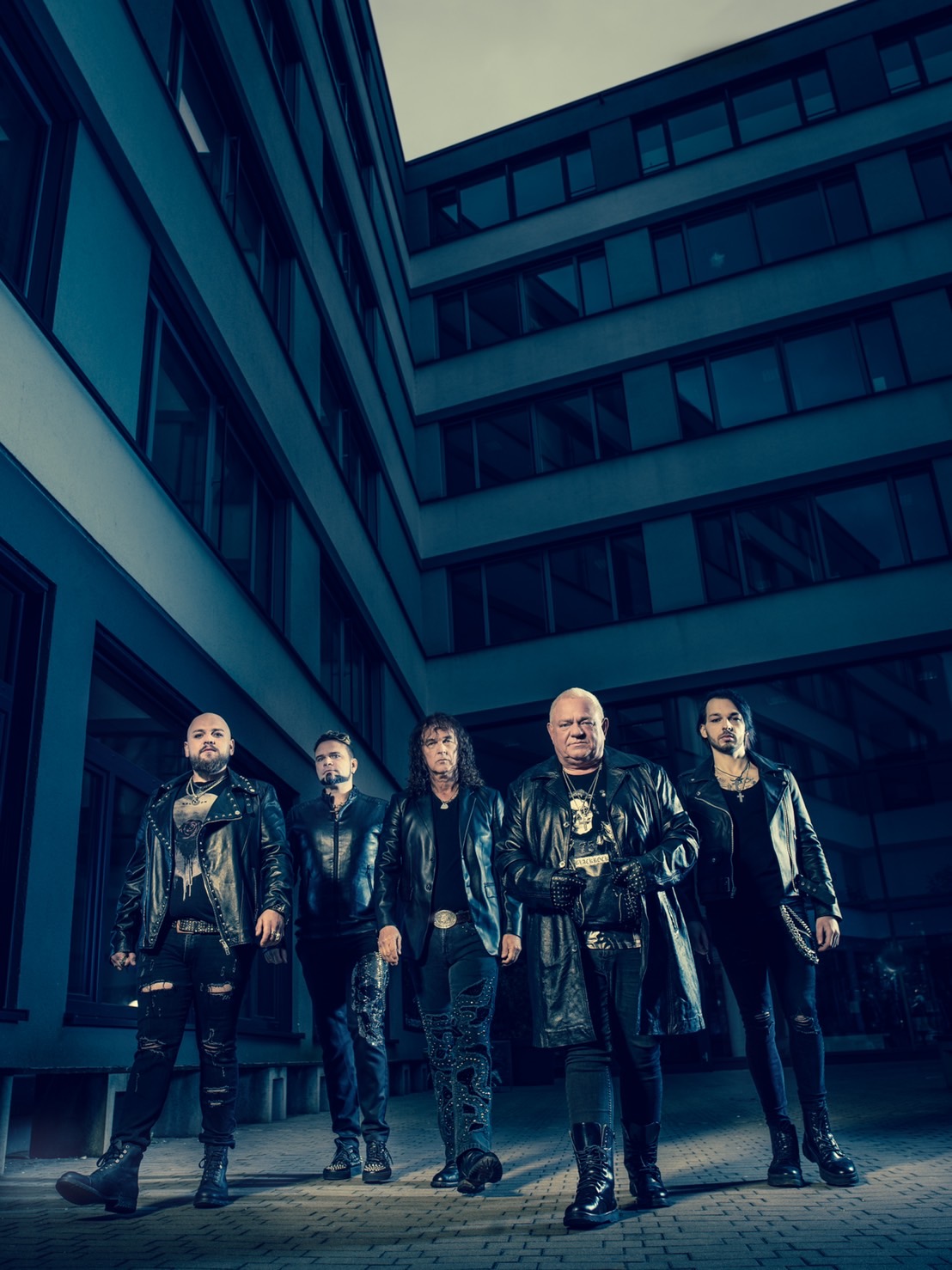Peter Baltes Interview

Q: I think I’m right I saying this is your 10th visit to Japan. Looking forward to coming back and is it good to be back out on the road generally speaking?
PB: It surprised me because I was sitting down to dinner with my wife when Sven, Udo’s son, called and said that their bass player had passed out on stage and was the hospital and they didn’t know what to do. It was on a Tuesday and he asked if I could learn 16 songs and meet them on Friday in Berlin and be onstage. I’d been out of it since I left Accept in 2018 and I did think ‘Can I do this?’ but I pulled it off and toured for three months, fifty shows in a row. The other guy isn’t coming back I guess and so Udo asked if I could do Japan and Australia with him. Yeah, why not?
ピーター・バルテスインタビュー
Q: 今回で10回目の来日ということでよろしいでしょうか?ツアーに戻るのは良いことなのでしょうか?
PB: 驚いたのは、妻と夕食をとっているときに、ウドの息子のスヴェンから電話があり、彼らのベーシストがステージで気を失って病院に入院していて、どうしたらいいかわからないと言われたことだ。火曜日だったが、16曲を覚えて金曜日にベルリンで会って、ステージに立つことができないか、と言われた。2018年にアクセプトを辞めてからずっと抜けていて、「できるかな」とは思ったけど、それをやってのけ、3カ月間、50公演のツアーを続けたんだ。もう一人は戻ってこないんだろうから、ウドから「一緒に日本とオーストラリアをやらないか」と言われたんだ。うん、いいんじゃない?と思ったわけだ。
Q: Two shows, two sets, probably well over three hours of music. How do you keep all that in your head?
PB: A lot of stuff is in there from the old days so I just have to refresh and the other stuff I’ve been sitting here playing every day and learning it. The nice thing about that is that when you learn it, it’s good to get and out and play it. It’s not like you are playing Balls To The Wall for the 10,000th time, it’s something new and I enjoy it very much.
Q: 2つのショー、2つのセット、おそらく3時間を優に超えるでしょう。どうやって全曲を覚えているのですか?
PB: 多くの曲は昔からのものなので、ちょっと記憶を呼び覚ます程度だが、他の曲は毎日ここに座って弾いて覚えているんだ。それのいいところは、覚えたら、実際にファンの前で演奏してみるのがいいということだ。Balls To The Wallを1万回目に演奏しているわけじゃないし、新しいもので、とても楽しい。
Q: Having been off the road for so long though, jumping back in to three months must have been physically demanding as well.
PB: It was but I’m in good shape but it was so different to Accept and when you are in a happy place it’s much easier. The old band turned out to be one man’s show and I didn’t want to be a part of that. I’m too old for the dumb stuff. Udo was very grateful to me and respectful and it was nice to see all the fans seeing me and Udo together. There were grown men crying in the front row and we had a lot of fun on stage with little jokes and stuff. You know we’ve been friends from day one and there has never been any animosity. It’s great to back with him and very refreshing. When we grew up together, we rehearsed every day.
Q: 長い間ツアーをしていなかったので、いきなり3ヶ月のツアーに参加するのは体力的にも大変だったと思います。
PB: そうなんだけど、体調はいいんだ。でも、アクセプトとは全然違っていて、幸せな場所にいると、もっと楽になるんだ。昔のバンドはワンマンショーになってしまって、僕はその一員になりたくなかった。馬鹿なことをするには年を取りすぎているんだ。ウドは僕にとても感謝し、敬意を払ってくれたし、ファンのみんなが僕とウドが一緒にいるのを見るのは嬉しかったよ。最前列では大の大人が泣いていたし、ステージ上ではちょっとしたジョークなどで盛り上がったよ。僕たちは初日から友人で、敵意があったことは一度もないんだ。彼と一緒に戻ってくるのは素晴らしいことだし、とても新鮮だ。僕らが一緒に育った頃は、毎日リハーサルをしていたんだ。
Q: You’re both from small towns, how far apart are they?
PB: Five miles. (8km) From the beginning, we spent most of our lives together, worked hard and everything we ever earned, we earned the hard way. Udo’s father had a company to Udo got a little finance and he financed the P.A. and the truck so he was very instrumental in everything and when I came back and I went on stage that first night, he opened his mouth and I was like ‘Oh my god! This is the real deal!’ I was immediately sent back in a time machine to the early days. It was that same voice, nothing had changed. It was almost a revelation to me that this was how it was supposed to be. With other players and other people, it sounds good but it’s never right. In Berlin, I realised that this was how it was supposed to sound. From that day on, I just enjoyed it. It was like coming home.
Q:お二人とも小さな町の出身ですが、どのくらい離れているのでしょうか?
PB: 5マイルだ。(8km)僕たちは人生のほとんどを一緒に過ごし、最初から懸命に働き、これまで得たものはすべて、苦労して手に入れたものだ。ウドの父親が会社をやっていたので、ウドが少し金をもらって、P.A.やトラックの資金を調達してくれたので、すべてにおいて彼がとても貢献してくれた。戻ってきて、最初の夜にステージに上がって、彼の歌を聴いたとき、「おお、これだよ!」と思った。まるでタイムマシンで初期に戻されたようだった。何も変わっていない、同じ声だったのだ。こうあるべきだという啓示を受けたような感じだった。他のミュージシャンや他の人と一緒に演奏すると、いい音にはなるのだが、決して正しい音にはならないのだ。ベルリンで、これが本来の音なのだと実感した。その日から、ただただ楽しい。まるで故郷に帰ってきたようだ。

Q: Your bass hero is Chris Squire. Presumably that is why your first bass was a Rickenbacker 4001?
PB: That is correct.
Q: あなたのベースヒーローはクリス・スクワイアです。おそらく、それがあなたの最初のベースがリッケンバッカー4001だった理由でしょう?
PB: その通り。
Q: Was the stack you used an Ampeg SVT amps and 8 x 10” cab?
PB: Hell no! (laughs) Who could afford that? I had an 18” speaker and I built the cabinet myself. You couldn’t lift it! It had no handles, no holes, no wheels. It was insane and I had a little thin thing on top – Fender I think it was – and it was just awful. The SVT came after I joined Accept and even in the beginning of Accept, I played Marshall. Later, after the first album, we did the first tour with Judas Priest in England that’s when I got the SVT.
Q: あなたが使っていたスタックはアンペグSVTアンプと8×10インチキャビネットだったのですか?
PB: とんでもない!(笑)誰がそんなものを買う余裕があるんだ?18インチ・スピーカーで、キャビネットは自分で作った。持ち上げることもできないほど重かった。取っ手も穴も車輪もなかった。その上、フェンダーだったかな、小さな薄型のものを載せていたんだけど、それはもうひどいものだった。SVTはアクセプトに加入してからで、アクセプトの最初の頃はマーシャルを弾いていた。ファースト・アルバムの後、ジューダス・プリーストとイギリスで最初のツアーをやったんだけど、その時にSVTを手に入れたんだ。
Q: When did you change from Rickenbacker to Fender Precision?
PB: That was Priest. I had the Rickenbacker which was stolen after sixty days.
Q:リッケンバッカーからフェンダー・プレシジョンに変えたのはいつですか?
PB: プリーストのツアーだった。リッケンバッカーを持っていたんだけど、60日後に盗まれたんだ。
Q: Oh no…
PB: Yeah. I had to work for it. I stood in a factory making something. I had to clock-in at five o’clock in the morning, walk in the dark for six weeks during the summer school holidays. I had enough money for it but not for a case so I had to put it in a paper bag with the top sticking out and six weeks later, the rehearsal room was broken into and gone it was. Then I had an Ibanez or something that looked like a Fender. It was a vintage had that for the Priest tour and then that was stolen on that tour! K.K. Downing and me went to his house where he had a bass. It was in perfect condition and I didn’t realise I had a belt on when playing and I screwed the back up. After that, I was on tour with Maiden in the States and backstage, the vintage dealers used to come and bring stuff and hope we would buy something. They had this white Fender Precision and I played it, Steve Harris played it, he offered $250, I offered $300 and I eventually got it for $450. I didn’t play it and when I got home I asked my tech if he could take that white finish off because I prefer the natural finish. When he took the neck off, I looked at the serial number and it was from 1959. That’s been with me ever since and I used to play it live but then I started to get worried about it, leaving it at festivals on the side of the stage and things so I decided it was time and now it stays home. Now I have something similar I play.
Q: そんな...。
PB: そう、それだけの金を稼ぐために働かなければならなかったんだ。工場でものを作っていたんで、夏休みの6週間、朝の5時に出勤して、暗闇の中を歩かされたんだ。金はあったんだけど、ケースはなかったので、紙袋に上からはみ出るように入れていたんだ。その6週間後、リハーサル室に泥棒が入って、その楽器がなくなってしまった。それから、イバネズかフェンダーに似たものを持っていた。プリーストのツアー用にヴィンテージのものを持っていたのだが、そのツアーで盗まれてしまった。 K.K.ダウニングと僕は彼の家に行き、彼がベースを貸してくれた。そのベースは完璧な状態だったけど、演奏するときにベルトをしていたことに気づかず、裏を傷つけてしまったんだ。その後、メイデンの米国ツアーに参加したんだけど、バックステージではヴィンテージ・ディーラーがやってきて、何か買ってくれないかと物を持ってくるんだ。彼らはこの白いフェンダー・プレシジョンを持っていて、僕もスティーブ・ハリスもそれを弾いて、彼は250ドル、僕は300ドルを提示し、最終的に450ドルで手に入れた。最初は弾かなかったんだけど、ドイツに帰ってから技術者に「自然な仕上げが好きなので、この白い仕上げを剥がしてもらえないか」と頼んだ。ネックを外してシリアルナンバーを見ると、1959年のものだった。それ以来、ずっと一緒にいて、ライブでも弾いていたんだけど、フェスでステージ脇に置いておくことなど、気になり始めたので、そろそろいいかと思って、今は家に置いてある。今は似たようなものを持っていて、演奏している。
Q: What did you use on the My Way album? Was it that bass?
PB: No because I recorded that in the studio with Stefan. I just used something that he had there but I did use it on Mick Mars’ solo album and I just did an album with Nozomu Wakai called Destinia and used it on that. If you listen to the track The Triggered, you can hear the bass in the intro and you get a good idea of what that bass is all about.
Q:『マイ・ウェイ』のアルバムでは何を使っていましたか?あのベースだったのでしょうか?
PB: いや、あれはステファンと一緒にスタジオで録音したもので、彼が持っていたものを使ったんだ。でも、ミック・マーズのソロ・アルバムや若井望とのアルバム『Destinia』では使ったよ。The Triggerという曲を聴くと、イントロでベースが聴こえるので、そのベースがどんなものなのかがよくわかると思う。
Q: Did you give yourself any directive to adapting the various bass styles and lines to the originals on My Way?
PB: It’s all in the fingers and the style of player that you are and since these were Udo’s favourites growing up, 90% of them were also my favourites but we never had the opportunity to play them. On this album we got to do Man On The Silver Mountain and Nutbush City Limits and The Stroke, things I always wanted to play anyway, except for that German song anyway, which I didn’t know – go figure (laughs). I just had a ball and didn’t have to think much. I played it how I wanted to play it but I did keep it within acceptable measures – don’t be weird, don’t be stupid. I give Udo a lot of credit for doing this because you usually get a lot of flack for doing covers but he didn’t give a shit. He’s seventy years old and he totally got it. At this time of life for him to take the piss out of it and do something he enjoys, why not?
Q: 『マイ・ウェイ』に収録されている様々なベースのスタイルやラインをオリジナルに合わせようとしたのですか?
PB: すべては指とプレイヤーのスタイルによるもので、これらは幼少期のウドの気に入りの曲で、90%は僕の気に入りでもあったんだけど、演奏する機会がなかったんだ。このアルバムでは、Man On The Silver MountainやNutbush City Limits、The Strokeなど、僕がずっと演奏したいと思っていたものを演奏することができた。あのドイツ語の曲を除いてはね。それは全然知らなかった、ドイツ人なのに。(笑)僕はただ楽しんで、あまり考える必要はなかった。自分の好きなように演奏したが、変なことはしない、バカなことはしない、という許容範囲に収めた。普通、カヴァーをやると非難されるものだが、彼はそんなことは構いなしだったので、これをやったことを高く評価する。彼は70歳だし、完全に理解したんだ。この時期に、自分が好きなことをやるというのは、いいことだと思う。
Q: what do you like to do when you are not doing anything musical?
PB: We live a mile from the beach and a pool in the house to relax in and we have a big album collection we like to listen to. My wife is a huge David Bowie fan so we have a whole section of the house with a couch and speakers and everything and so sometimes we just sit and listen to records. I don’t know…I’m very normal. The one thing you’ll learn from me is that I never went into this for fame and fortune, it was always for the craft of creating and playing. I hated doing Meet and Greets. The other guys liked it to show off their rings and stuff but I hated them.
Q:音楽活動をしていないときは、何をするのが好きですか?
PB: うちの家はビーチから1マイルのところに住んでいて、家の中にはプールもあるのでリラックスできるし、好きなアルバムのコレクションもたくさん持っている。妻はデヴィッド・ボウイの大ファンなので、家の一角にソファやスピーカーなどを置いて、ただ座ってレコードを聴くこともあるんだ。なんか、僕はとても普通な人間だよ。僕から学べることは、僕は決して名声や富を得るためにこの業界に入ったわけではなく、常に創造と演奏の技術のために入ったということだ。僕はミート&グリートが嫌いだった。他のメンバーは指輪を見せびらかしたりするために好きなんだけど、僕は大嫌いだった。
Q: Are you still a Prog Rock fan?
PB: I am! Pictures At An Exhibition by Emerson, Lake and Palmer. You know, the songs have to be long, you have to dive in and digest them. Pink Floyd, Genesis, Yes…there was so much and if you compare it to today’s music, it stands, easily. Most of it doesn’t even come close. Peter Gabriel, his solo stuff, my god…Even in the MTV times when he was doing Sledgehammer and stuff like that, it was commercial but totally different to anything else. I was also into Nektar which was a German band and Tangerine Dream. You know I’ve been working on my solo record for the last couple of years…
Q:今でもプログレファンなのですか?
PB: そうだよ! エマーソン、レイク・アンド・パーマーの「Pictures at an Exhibition」とか。曲は長くなければならないし、飛び込んで消化しなければならない。ピンク・フロイド、ジェネシス、イエス...本当にたくさんあって、今の音楽と比べたら、楽勝で成り立っているよ。ほとんどの音楽は、それに及ばないんだ。ピーター・ガブリエル、彼のソロ作品は素晴らしい。MTV時代、「スレッジハンマー」などをやっていた頃も、商業的ではあったが、他のものとは全く違ったものだった。ドイツのバンド、ネクターやタンジェリン・ドリームも好きだった。実はここ数年、自分のソロアルバムに取り組んでいる...。
Q: I was going to ask you about that.
PB: …well you are going to love it because it is everything we have just talked about. It’s a mixture of Rainbow, Purple, ELP and Yes.
Q: それについて聞こうと思ったのですが。
PB: 今話したような音楽がたくさん入っているから、きっと気に入ると思うよ。レインボー、ディープ・パープル、ELP、そしてイエスを混ぜたようなサウンドなんだ。
Q: Peter, we shall leave it there but this conversation will continue when we meet in Japan.
PB: Alright man. I’ll see you when I get there.
Q: ピーター、この話はこの辺にして、日本で会ったときにこの話を続けることにしましょう。
PB: わかった。日本に着いたら、また会おう。

Copyright © 2023 Upp-tone music Co., Ltd. All Rights Reserved.